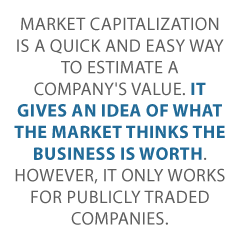What is a Business Valuation? According to Investopedia, “A business valuation is a general process of determining the economic value of a whole business or company unit.” Basically, it determines how much your business is worth. A business valuation gives your business an objective estimate of value. It is usually done by a professional business evaluator
Why Would You Need a Business Valuation?
The obvious reason is to determine sale value. However, you may also need one to establish partner ownership or for tax purposes.
When Do You Have to Have a Business Valuation?
Some events trigger the need for a valuation. In these cases, it isn’t optional. You must have one when a shareholder dies, closely-held stock is given as a gift, or you need an equity compensation valuation.
You also need one when there is a dispute as to business value. For example in the case of a shareholder dispute or a divorce. Other reasons include if you need to create an employee stock ownership plan, you are converting from a C-corp to an S-corp, a charitable contribution is made, or you have to allocate intangible asset
Equity Compensation Valuations
You need one to complete an equity compensation valuation, but they are not the same. Equity compensation is the non-cash pay representing ownership in a business. It can include options, restricted stock, and performance shares. It allows employees to share in the profits via appreciation and can encourage retention, particularly if there are vesting requirements. To determine the value of the equity compensation, you must first have a business valuation.
Keep your business protected with our professional business credit monitoring.
How Can a Business Valuation Change the Way You View Your Business?
Many business owners have no clue what their business is worth. Most think it is worth more than it actually is, though some may not recognize the gold mine they are sitting on. Knowing what your business is worth can change the way you view your business. You can begin to recognize what you have to work with.
You can see potential for growth, and also get a handle on worst case scenarios if you have to liquidate quickly. It allows you to get a handle on what you are working for, and how your previous hard work has paid off. Valuation lets you see where you stand and can help you plan for the future. For example, if you want to retire with a certain amount and you intend for the sale of your business to help you reach that goal you must know what your business is worth.
How do you Assign Value to a Business?
There are several methods for valuing a business. They include market capitalization, times revenue method, earnings multiplier, discounted cash flow (DCF), method, book value, and liquidation value.
The Market Capitalization Method
Market capitalization refers to the total market value of a business’ total outstanding shares of stock. it’s often called the “market cap.” It is calculated by multiplying the total number of a company’s outstanding shares by the current market price of one share.Companies are typically divided according to market capitalization as follows: large cap equals $10 billion or more, mid cap equals $2 billion to $10 billion, small cap equals $300 million to $2 billion.
Market capitalizationis a quick and easy way to estimate a company’s value. It gives an idea of what the market thinks the business is worth. However, it only works for publicly traded companies. This also means, of course, that the market cap changes with changes in the market.
A simple example of the market capitalization method: Consider a business has 1 billion shares of stock outstanding. If the current market price of one share is $2, then the market cap would be 1 billion shares x $2, or $2 billion. This would put it in the mid cap range.
The Times Revenue Method
The times revenue method of business valuation applies a multiplier to revenue over a specific period of time. The multiplier depends on the industry and economic environment. For example, a tech company may be valued at 3x revenue, while a service firm may be valued at 0.5x revenue.
The times revenue method determines a maximum value, or ceiling. You can use it to determine a range of values. You can apply the multiplier to projects to estimate future value. Again, the multiplier used depends on the industry the business is in and the current economic environment.
Keep your business protected with our professional business credit monitoring.
Earnings Multipliers
The earnings multiplier is actually a more accurate way to get real company value than the times revenue method. This is because the earnings multiplier considers future profits against cash flow potential at the current interest rate over the same time period. Put another way, it adjusts the current price-to-earnings ratio (P/E Ratio) for current interest rates.
The P/E ratio shows the earnings per share of stock in relation to the current price of the stock. This process acts as a quick and dirty tool to help compare the cost of the stocks with other, similar companies. It can help investors judge current prices of stock in relation to historical prices.
An Example
These two methods are calculated the same way, but with different multipliers. The revenue number may look different as well, depending on the period of time you use in the calculation. Imagine a company has an adjusted net profit of $1,000 and the multiplier is 4.
Then the value of the business is $1,000 x 4, or $4,000. To a potential buyer, this means that, as long as profits are continued at the same level, they will receive about $1,000 per year for the $4,000 investment, or a return of 25%.
The Discounted Cash Flow Method
The discounted cash flow method (DCF) is similar to the earnings multiplier. It too uses projections of future cash flows and adjusts them to get the current market value of the company. The difference is this method takes inflation into account when calculating the present value. The goal of the DCF method is to determine the current value of an investment based on projections of how much money it will generate in the future.
The purpose of this valuation method is to get an idea of the money an investor would make from an investment. It is adjusted for the time value of money.The time value of money is the idea that a dollar today is worth more than that same dollar would be tomorrow. This is because you could invest that dollar today, but if you waited until tomorrow it would be invested one day less. Therefore it would be earning for one day less. As a result, it would not be worth as much.
To help understand the time value of money, and thus how it affects the DCF method, consider the following example. Imagine a company releases a new product on January 1st that is hugely successful. Any investors waiting until January 2nd to invest would not benefit from those first day sales. Therefore, their investment is not worth as much as if they had invested on January 1.
Book Value
Book value is simply the value of equity from the balance sheet. You get it by subtracting total business liabilities from total business assets. The book value is the total value of company assets stockholders would receive, theoretically, if the business were liquidated. Compare it to market value to help determine if stocks are over- or underpriced.
So, if a business has total assets on the balance sheet that equal $10,000, and they have total liabilities that equal $4,000, the book value of the company is $6,000. That means, if the business were liquidated, the stockholders would split $6,000 based on the number of shares they hold.
Liquidation Value
Liquidation value is a little easier to understand. It is the value of the company’s assets as they are today. Basically, it shows the cash a business would receive if assets were sold and all debts paid off today. This includes assets such as real estate, fixtures, equipment, and inventory.
It’s important to note that intangible assets are not included in this calculation of business value. Intangible assets are assets that are not physical, like goodwill and intellectual property like patents, trademarks, and copyrights. Liquidation value will differ from book value. This is because book value uses what you paid for the assets minus depreciation, not what you could sell the asset for today.
Keep your business protected with our professional business credit monitoring.
Which Method Should You Use?
As you may have guessed, each method can yield a different value. The method you should use depends on your purpose for the valuation. For example, if you are trying to sell your business, potential buyers will want to know the income potential of the business. You must know that as well to price the business fairly.
For pricing a business to sell, an income-based approach, like the times revenue or earnings multiplier method may work best. However, if you are trying to determine a value for a divorce proceeding, an asset method may be better.
Which asset method you want to use will depend on which side you are on. If you are receiving the money, you may prefer the liquidation method. If you are paying, you may prefer to use the book value method. This depends on the difference in what you paid for the assets and what they would sell for today.
There are no hard rules on which method you should use when it comes to selling your business. Your business will always be worth what you are willing to sell it for, and what a potential buyer is willing to pay for it. Value is calculation. Price is a negotiation. That said, if you need a valuation for another reason, you may have to use a specific method.
Who can do a Valuation?
An official business valuation in the US must be completed by an Accredited Business Valuation (ABV) professional. This is an accreditation accountants can get for specializing in calculating the value of businesses. The certification is handled by the American Institute of Certified Public Accountants (AICPA). To get a certification in business valuation, an accountant must (among other things), pass the required exam and meet minimum business experience and education requirements.
Of course, you can calculate the value of your business using any of these methods yourself. This is assuming you know the formulas and the numbers to plug in. But it will not stand for official purposes. Also, you run the risk of being wrong and losing out in the long run. It is definitely better to have an ABV specialist handle this.
Business Valuation: Takeaways
Business valuation assigns economic value to a whole business. There are several reasons you may need a valuation. These include pricing your business for sale, or for divorce proceedings, and some events require that a valuation be done.
It can also change the way you view your business. There are many methods for assigning value to a business. The one you choose will depend on the reason for doing the valuation. An official business valuation must be done by an Accredited Business Valuation professional.
The post Business Valuation appeared first on Credit Suite.






